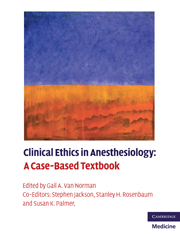Book contents
- Clinical Ethics in Anesthesiology
- Clinical Ethics in Anesthesiology
- Copyright page
- Dedication
- Contents
- Contributors
- Foreword
- Preface
- 1 Consent and refusal
- 2 End-of-life issues
- 3 Pain management
- 4 Research and publication
- 5 Practice issues
- 36 The impaired anesthesiologist – addiction
- 37 The impaired anesthesiologist – sleep deprivation
- 38 Ethical considerations regarding the disabled anesthesiologist
- 39 The abusive and disruptive physician
- 40 Sexual harassment, discrimination, and faculty–student intimate relationships in anesthesia practice
- 41 Conflicts of interest – industry gifts to physicians
- 42 Disclosure of medical errors in anesthesiology practice
- 6 Anesthesiologists, the state, and society
- Index
40 - Sexual harassment, discrimination, and faculty–student intimate relationships in anesthesia practice
from 5 - Practice issues
Published online by Cambridge University Press: 05 March 2012
- Clinical Ethics in Anesthesiology
- Clinical Ethics in Anesthesiology
- Copyright page
- Dedication
- Contents
- Contributors
- Foreword
- Preface
- 1 Consent and refusal
- 2 End-of-life issues
- 3 Pain management
- 4 Research and publication
- 5 Practice issues
- 36 The impaired anesthesiologist – addiction
- 37 The impaired anesthesiologist – sleep deprivation
- 38 Ethical considerations regarding the disabled anesthesiologist
- 39 The abusive and disruptive physician
- 40 Sexual harassment, discrimination, and faculty–student intimate relationships in anesthesia practice
- 41 Conflicts of interest – industry gifts to physicians
- 42 Disclosure of medical errors in anesthesiology practice
- 6 Anesthesiologists, the state, and society
- Index
Summary
- Type
- Chapter
- Information
- Clinical Ethics in AnesthesiologyA Case-Based Textbook, pp. 240 - 244Publisher: Cambridge University PressPrint publication year: 2010



